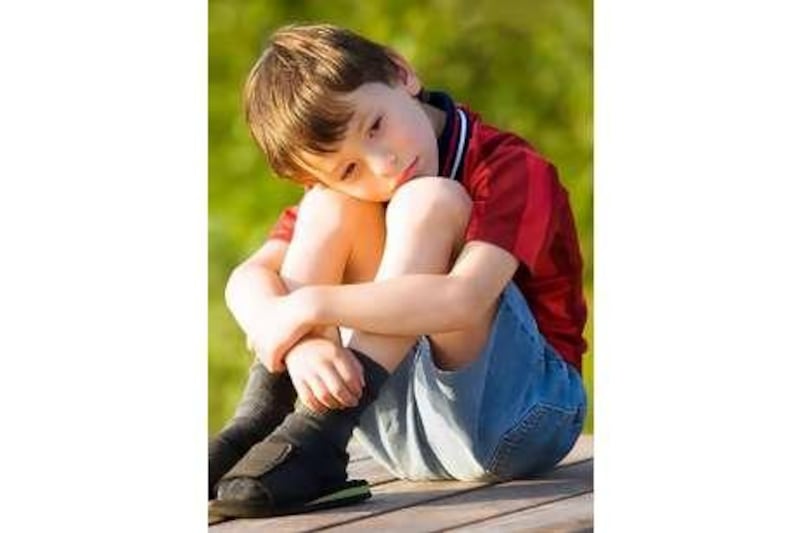No stress, no work, lots of time to play and plenty of freedom. You might wonder what children have to be depressed about. But increasingly the question seems to be, what have they got to be happy about? In the UAE, an estimated one in 33 children under 12, and one in eight adolescents, suffers from significant depression, according to Dr Timo Brosig, the senior consultant for neurology at the German Center for Neurology and Psychiatry in Dubai Healthcare City.
Figures are set to rise as effects of the credit crisis - the potential job losses, involuntary repatriation and upset at home - will have a negative impact on young people. "It's particularly going to affect expatriates in the UAE," Brosig says, "and it may well lead to an increase in childhood depression." And that's not the only reason the condition is on the rise. "It's really only in the last 20 years that doctors have recognised that children can get depressed," says Alexandra Massey, the author of Happy Kids: Understanding Childhood Depression and How to Nurture a Happy, Well-Balanced Child. "And childhood is changing for the worse."
The rise in divorce rates, stress and general anxiety in the home - not helped by financial problems - all make it harder for children to cope. Dr Rajendra Joshi of the Prime Healthcare Centre in Dubai, says that growing up in the UAE can put them more at risk. "Kids of all ages, local or expat, are being looked after by maids of different nationalities and cultural backgrounds, causing a communication problem. Often they are not interested in playing or engaging with kids, so they spend more time watching TV than is healthy. And having no relatives, neighbours or friends for children to play with can make them introverted."
Massey, who suffered depression as an expatriate child in Trinidad, agrees. "I was very depressed," she said. "I could barely move and could barely function when I had it. "It wasn't because I was an expat - I think I would have been depressed wherever I was. It was my parenting. My mother was more interested in partying than in me, and I felt neglected. I had staff looking after me, but my primary attachment - my mum - didn't give me the communication I needed."
Depression is more common in children who come from families with a history of mental illness and suicide, as well as those from abusive homes, those who suffer long illnesses, have lost a parent or who have divorced parents. It's also thought that depression can be a learned behaviour passed from depressed parents to their children. The long-term consequences are worrying: relapses in adulthood, the likelihood of dropping out of college or school at an earlier age, and an increased risk of suicide.
So how do you tell if your child is depressed? Childhood depression has much in common with adult depression in terms of symptoms, but there are some differences. Where adults can articulate their feelings better, children might show depression through aches and pains that have no physical basis; they might also act out and behave badly. What's the difference between that and simple bad behaviour? That's a good question. Each case is unique and it's a difficult condition to diagnose.
In the UK, children as young as four have been prescribed Prozac for depression, and the jury is still out on whether drugs are a good way to treat the condition in children. Not only is the dosage hard to establish, but its effect on development, as well as possible side effects, are not really understood. Therapy is another treatment to explore. If you suspect that your child is depressed, the first step is to visit your family doctor. There are a number of paediatric psychology specialists in the UAE, and a great website for support and advice is www.depnet.ae. It has message boards and an online diary facility for both sufferers and those caring for them. It can also put you in touch with the relevant specialists.
Reducing stress, providing a stable environment for your children and helping to build their self-esteem can help decrease the chances of your children developing depression. Simple factors like eating meals together as a family also can help. High amounts of sugar, salt and junk food can also make things worse - it's another instance where fresh fruit and vegetables really help. Joshi says that preparation is important.
"Avoid sudden changes in kids' environment and prepare them in advance," he says. "Do not underestimate the power of sport, music and dancing. And, of course, prevention is better than the cure. Early diagnosis and treatment are essential in childhood depression. Children who exhibit symptoms should be referred to and evaluated by a specialist." Massey looks at it from an emotional perspective: "Children must be in an environment where they can talk to their parents freely about their feelings.
"Kids who are depressed need to be listened to. You need to get down to their level to understand their world and where they're coming from. The instinct is to say that it will all be fine next week, but you need to let them know that you understand how awful it is right now. Fifteen minutes of non-judgemental listening time where you validate their emotions, saying 'I can see that it's difficult when?' is what's needed. There's more magic in that than in therapy."






